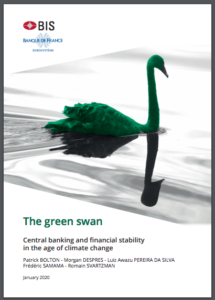Full Title: The Green Swan: Central Banking and Financial Stability in the Age of Climate Change
Author(s): Patrick Bolton, Morgan Despres, Luiz Awazu Pereira Da Silva, Frédéric Samama, Romain Svartzman
Publisher(s): BIS
Publication Date: January 1, 2020
Full Text: Download Resource
Description (excerpt):
Climate change poses new challenges to central banks, regulators and supervisors. This book reviews ways
of addressing these new risks within central banks’ financial stability mandate. However, integrating
climate-related risk analysis into financial stability monitoring is particularly challenging because of the radical uncertainty associated with a physical, social and economic phenomenon that is constantly
changing and involves complex dynamics and chain reactions. Traditional backward-looking risk
assessments and existing climate-economic models cannot anticipate accurately enough the form that
climate-related risks will take. These include what we call “green swan” risks: potentially extremely
financially disruptive events that could be behind the next systemic financial crisis. Central banks have a role to play in avoiding such an outcome, including by seeking to improve their understanding of climaterelated risks through the development of forward-looking scenario-based analysis. But central banks alone cannot mitigate climate change. This complex collective action problem requires coordinating actions among many players including governments, the private sector, civil society and the international
community. Central banks can therefore have an additional role to play in helping coordinate the measures
to fight climate change. Those include climate mitigation policies such as carbon pricing, the integration of sustainability into financial practices and accounting frameworks, the search for appropriate policy mixes, and the development of new financial mechanisms at the international level. All these actions will be complex to coordinate and could have significant redistributive consequences that should be adequately handled, yet they are essential to preserve long-term financial (and price) stability in the age of climate change.
